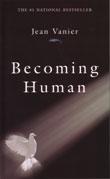Becoming Human

 Jean Vanier’s book, Becoming Human, emerged from the CBC Massey lectures that he delivered in 1998. As such, Vanier’s writing has a very conversational tone: it is easy to imagine he is speaking right to you, person to person. This stems from the original oral form of “Becoming Human,” but also, I think, from Vanier’s particular style of writing and of sharing deep truths in a clear and compassionate voice.
Jean Vanier’s book, Becoming Human, emerged from the CBC Massey lectures that he delivered in 1998. As such, Vanier’s writing has a very conversational tone: it is easy to imagine he is speaking right to you, person to person. This stems from the original oral form of “Becoming Human,” but also, I think, from Vanier’s particular style of writing and of sharing deep truths in a clear and compassionate voice.
Jean Vanier is the founder of l’Arche, which began when Vanier opened his home (in 1964) to men with intellectual disabilities. Now there are l’Arche communities found worldwide, all committed to providing a home for the disabled where they can experience love, growth and meaningful communion with others. In “Becoming Human,” he relates numerous personal experiences he has had with residents of l’Arche communities, often individuals who came from very rough or unloving backgrounds and seemed themselves unlovable. Yet with love and support these individuals grew; indeed, they blossomed with love, finding the freedom to openly express their true selves.
Put succinctly, this book is an affirmation of life, of the intrinsic value of all human life, and the beauty of each human person that, while often buried, never ceases to exist and is always capable of rising to the surface again. Vanier movies from a discussion of the loneliness we all experience to our common need for belonging. From there, he identifies fear as the powerful enemy that prevents us from including and from the recognizing value in the weak and marginalized in society (as well as in ourselves).
But this book does not just present the difficulties and obstacles we face in living and loving; it has an extraordinary message of hope. Vanier’s words do not accuse or condemn. Instead, they appeal to what is most human within us and call us to recognize and embrace the fullness and beauty of our humanity: that is, to become fully human. He invites us to pass through the door to freedom, for once we free our own heart from the fears and prejudices enslaving it, we are also free to love and foster the kind of community that values life and fosters growth.
I absolutely love this book and it is one that I will certainly reread and keep with me. Vanier writes, as I mentioned above, in such a personable way. His message is infinitely relatable, because it appeals to feelings and longings that are natural and universally experienced. Although his words are brimming with truth and profound insight that if followed could, I think, truly change the world, the book is lucidly written and the message is simple.
One of the most beautiful and moving parts of the book, for me, was Vanier’s exploration of love and its power to address loneliness and offer healing. He explains “seven aspects of love that seem necessary for the transformation of the heart in those who are profoundly lonely. They are: to reveal, to understand, to communicate, to celebrate, to empower, to be in communion with another, and, finally, to forgive” (Vanier 22).
Aren’t we all searching for this kind of love: a love that reveals our deepest identity, a love that understands us, rejoices in our presence, affirms our existence, and does not keep a “record of wrongs”? Although we may try to earn love or to prove that we are good enough and worthy of love by saying and doing the right things, what the heart really desires is this singular affirmation of the value and dignity of the self. Here I think of a quote from the philosopher Josef Pieper’s book, “Faith, Hope and Love.” This quote is Pieper’s expression of what the lover says to the beloved in a genuine experience of love: “It is good that you are! How wonderful that you exist!”
I’ll finish off this review by including one of the most profound and powerful quotes that has stayed with me from Vanier’s “Becoming Human”:
“The belief in the inner beauty of each and every human being is at the heart of l’Arche, and at the heart of all true education and at the heart of being human. As soon as we start choosing and judging people instead of welcoming them as they are – with their sometimes hidden beauty, as well as their more frequently visible weaknesses – we are reducing life, not fostering it. When we reveal to people our belief in them, their hidden beauty rises to the surface where it may be more clearly seen by all” (Vanier 23).